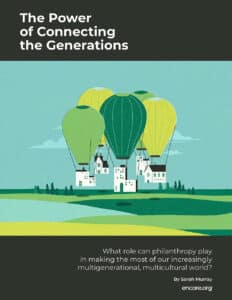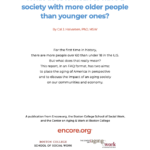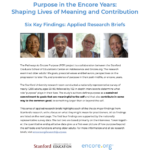All Research Reports
Beyond Passing the Torch: Recommendations on Leveraging Age Diversity to Build a Stronger Democracy Now
The Power and Promise of Intergenerational Collaboration
The Power of Connecting the Generations
#Gen2Gen Cities: A Guide to Intergenerational Strategies for Public Sector Innovators Seeking Solutions to Community Challenges
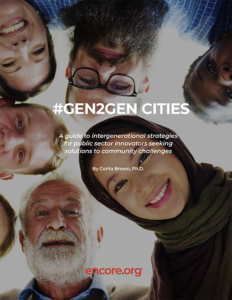 The #Gen2Gen Cities report highlights innovative city and county leaders who are meeting critical challenges — affordable housing, nonprofit capacity, kindergarten readiness, and much more — by bringing generations together. By leveraging the assets of residents of all ages and connecting the generations, these public sector leaders — and many others — are helping to build stronger ties, foster greater empathy, make better use of public spaces, increase volunteerism and save money, all while improving outcomes for residents of all ages.
The #Gen2Gen Cities report highlights innovative city and county leaders who are meeting critical challenges — affordable housing, nonprofit capacity, kindergarten readiness, and much more — by bringing generations together. By leveraging the assets of residents of all ages and connecting the generations, these public sector leaders — and many others — are helping to build stronger ties, foster greater empathy, make better use of public spaces, increase volunteerism and save money, all while improving outcomes for residents of all ages.
Second Acts Fellows: A New Way to Help Youth-Serving Nonprofits Leverage Encore Talent
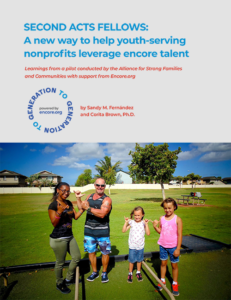 Nearly three years ago, nine youth-serving nonprofits — all members of the Alliance for Strong Families and Communities — hired a diverse group of professionals over 50. They dubbed them Second Acts Fellows and tasked them with recruiting a new and growing source of talent — people over 50 — to improve the lives of the children and youth they serve. Today, a new report released by Encore.org’s Gen2Gen campaign concludes that the strategy of employing fellows over 50 to help nonprofits tap encore talent “holds enormous potential” to change lives, organizations, even attitudes about older workers themselves.
Nearly three years ago, nine youth-serving nonprofits — all members of the Alliance for Strong Families and Communities — hired a diverse group of professionals over 50. They dubbed them Second Acts Fellows and tasked them with recruiting a new and growing source of talent — people over 50 — to improve the lives of the children and youth they serve. Today, a new report released by Encore.org’s Gen2Gen campaign concludes that the strategy of employing fellows over 50 to help nonprofits tap encore talent “holds enormous potential” to change lives, organizations, even attitudes about older workers themselves.
Efficiencies on the Road to a Multigenerational Workforce
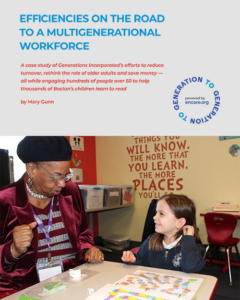 When Mary Gunn took over as the new executive director of Generations Incorporated — a Boston-area nonprofit working to strengthen the literacy skills of young children by engaging people over the age of 50 as volunteer literacy tutors — her first impression was a powerful one. “I was struck by how young the staff was,” she writes. “I was easily 25 years older than the next oldest person in the room.” Her second impression: “All my colleagues were bright, hard-working and passionate about our mission. I was lucky to be among them, even if I was old enough to be their mother.” In the years since, Generations Incorporated has: built a multigenerational team reduced turnover expanded the size of its volunteer corps by 40 percent increased the number of children it serves by 75 percent improved reading outcomes, and decreased its operating budget by 12.5 percent. All at the same time. You can read about how they did it and what they learned along the way in a new case study “Efficiencies on the Road to a Multigenerational Workforce,” written by Gunn and published by Encore.org.
When Mary Gunn took over as the new executive director of Generations Incorporated — a Boston-area nonprofit working to strengthen the literacy skills of young children by engaging people over the age of 50 as volunteer literacy tutors — her first impression was a powerful one. “I was struck by how young the staff was,” she writes. “I was easily 25 years older than the next oldest person in the room.” Her second impression: “All my colleagues were bright, hard-working and passionate about our mission. I was lucky to be among them, even if I was old enough to be their mother.” In the years since, Generations Incorporated has: built a multigenerational team reduced turnover expanded the size of its volunteer corps by 40 percent increased the number of children it serves by 75 percent improved reading outcomes, and decreased its operating budget by 12.5 percent. All at the same time. You can read about how they did it and what they learned along the way in a new case study “Efficiencies on the Road to a Multigenerational Workforce,” written by Gunn and published by Encore.org.
What does it mean to have a society with more older people than younger ones?
Purpose in the Encore Years: Shaping Lives of Meaning and Contribution
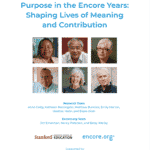 The Stanford University research team examined older adults’ life goals, prosocial values and behaviors, perspectives on the progression to later life, and prevalence of purpose in their post-midlife, or encore, years.
The Stanford University research team examined older adults’ life goals, prosocial values and behaviors, perspectives on the progression to later life, and prevalence of purpose in their post-midlife, or encore, years.
Information was gathered through a nationally representative survey of nearly 1,200 adults, ages 50-90, followed by in-depth interviews with 102 of survey respondents to determine what role “purpose” plays in their lives. Taken together, the quantitative and qualitative data give us a first-ever picture of how purpose beyond the self looks and functions among older adults.
This mixed-methods study resulted in six key findings. The first four findings are supported by the survey data. The last two are based primarily on the interviews.
Purpose in the Encore Years: Shaping Lives of Meaning and Contribution — Six Key Findings: Applied Research Briefs
Programs Supporting Encore Purpose: Mapping an Emerging Landscape
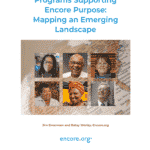 To complement the Stanford research, CoGenerate conducted a national survey to learn more about the landscape of programs and organizations that support older adults’ purposeful goals. This survey sought to better understand the services available to individuals seeking pro bono and paid engagements with social purpose organizations; and the services available to organizations that want to engage these purpose-seekers.
To complement the Stanford research, CoGenerate conducted a national survey to learn more about the landscape of programs and organizations that support older adults’ purposeful goals. This survey sought to better understand the services available to individuals seeking pro bono and paid engagements with social purpose organizations; and the services available to organizations that want to engage these purpose-seekers.
In the course of analyzing the survey responses, and based on decades of work in this field, the CoGenerate team also identified opportunities for new programs and offerings to fill gaps that became apparent.

